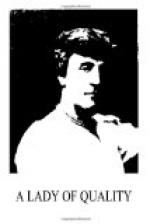him such perfections had been given to their name
and house. From that time, at all special assemblies
given by his kinsman he was present, the observed
of all observers. He was a man of whom ’twas
said that he was the most magnificent gentleman in
Europe; that there was none to compare with him in
the combination of gifts given both by Nature and
Fortune. His beauty both of feature and carriage
was of the greatest, his mind was of the highest,
and his education far beyond that of the age he lived
in. It was not the fashion of the day that men
of his rank should devote themselves to the cultivation
of their intellects instead of to a life of pleasure;
but this he had done from his earliest youth, and
now, in his perfect though early maturity, he had
no equal in polished knowledge and charm of bearing.
He was the patron of literature and art; men of genius
were not kept waiting in his antechamber, but were
received by him with courtesy and honour. At
the Court ’twas well known there was no man
who stood so near the throne in favour, and that there
was no union so exalted that he might not have made
his suit as rather that of a superior than an equal.
The Queen both loved and honoured him, and condescended
to avow as much with gracious frankness. She
knew no other man, she deigned to say, who was so worthy
of honour and affection, and that he had not married
must be because there was no woman who could meet
him on ground that was equal. If there were
no scandals about him—and there were none—’twas
not because he was cold of heart or imagination.
No man or woman could look into his deep eye and
not know that when love came to him ’twould be
a burning passion, and an evil fate if it went ill
instead of happily.
“Being past his callow, youthful days, ’tis
time he made some woman a duchess,” Dunstanwolde
said reflectively once to his wife. “’Twould
be more fitting that he should; and it is his way
to honour his house in all things, and bear himself
without fault as the head of it. Methinks it
strange he makes no move to do it.”
“No, ’tis not strange,” said my
lady, looking under her black-fringed lids at the
glow of the fire, as though reflecting also.
“There is no strangeness in it.”
“Why not?” her lord asked.
“There is no mate for him,” she answered
slowly. “A man like him must mate as well
as marry, or he will break his heart with silent raging
at the weakness of the thing he is tied to.
He is too strong and splendid for a common woman.
If he married one, ’twould be as if a lion had
taken to himself for mate a jackal or a sheep.
Ah!” with a long drawn breath—“he
would go mad—mad with misery;” and
her hands, which lay upon her knee, wrung themselves
hard together, though none could see it.
“He should have a goddess, were they not so
rare,” said Dunstanwolde, gently smiling.
“He should hold a bitter grudge against me,
that I, his unworthy kinsman, have been given the
only one.”




